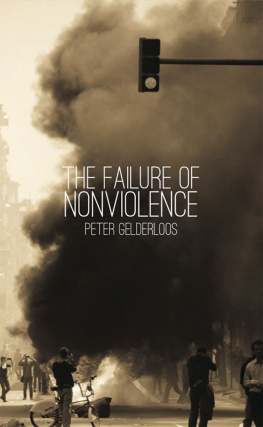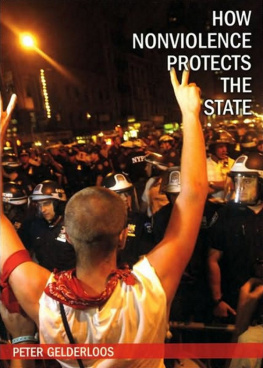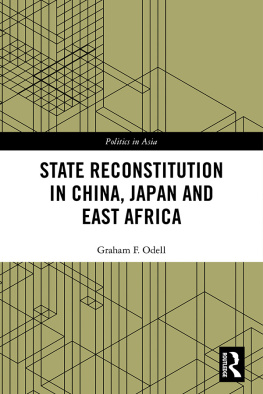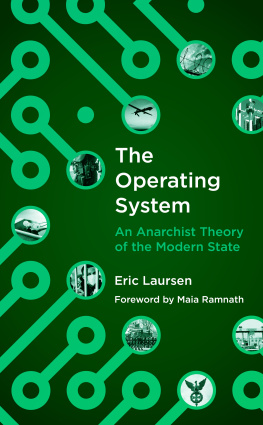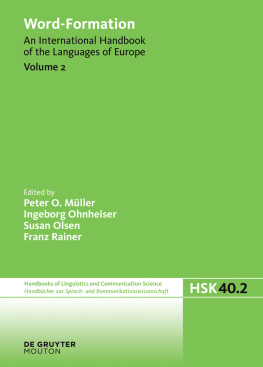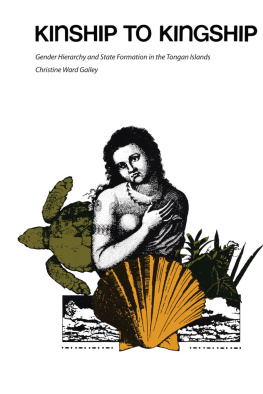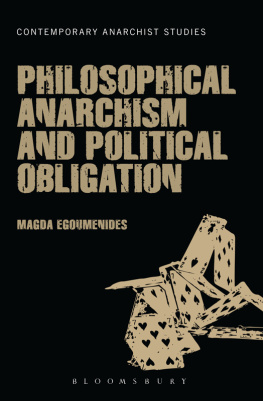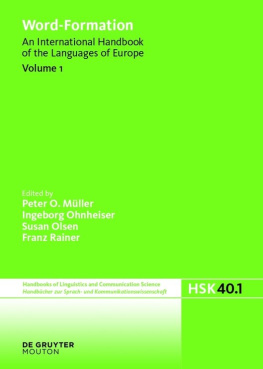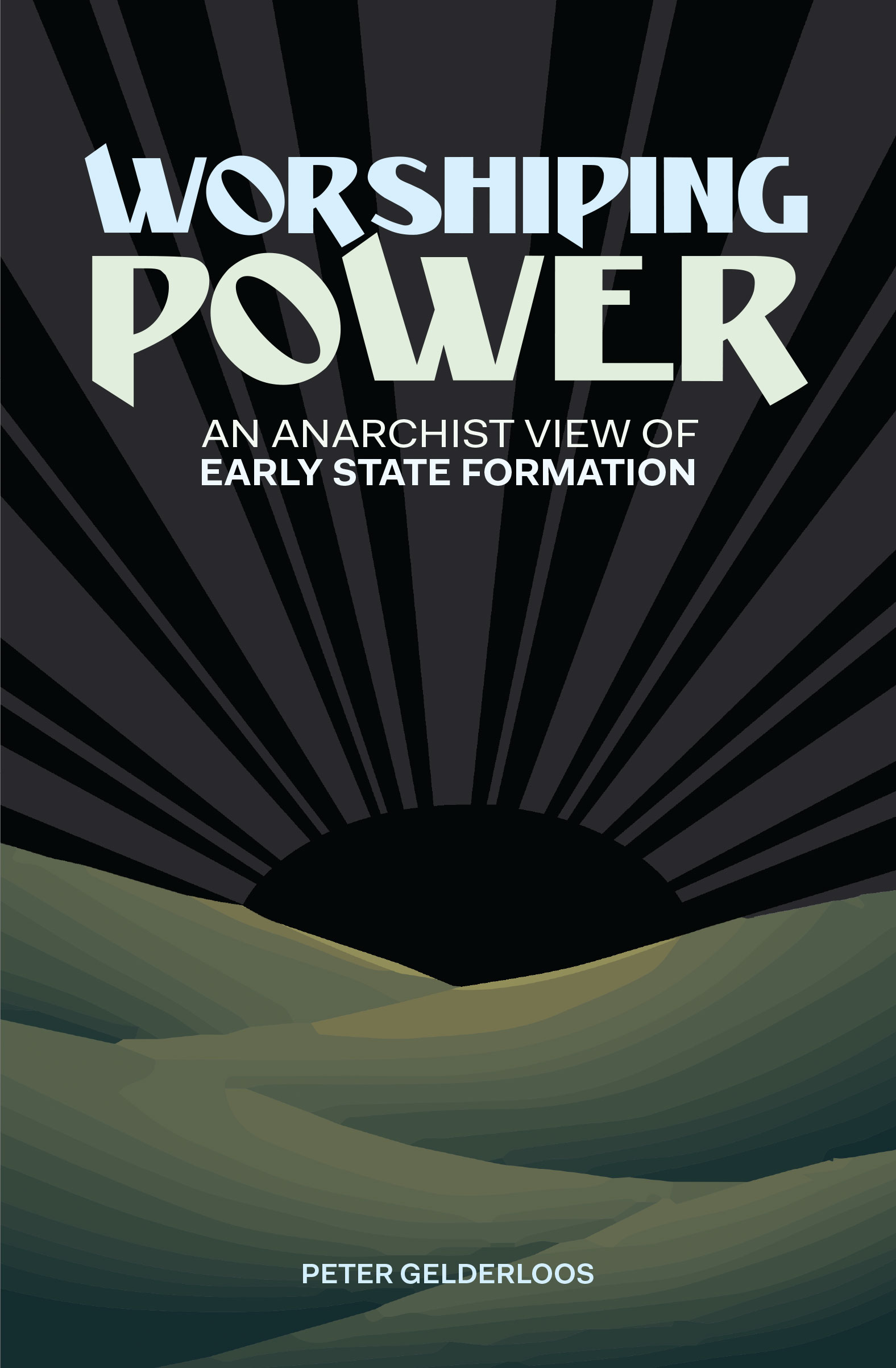I. Take Me to Your Leader:
The Politics of Alien Invasion
II. Ze Germans: A State-Making Technology
III. Save Me from Yourself: The Statist Spread of Salvation Religions
IV. Sleeper States and Imperial Imaginaries:
Authoritys Afterlife and Reincarnation
V. The Modern State: A Revolutionary Hybrid
VI . Zomia: A Topography of Positionality
VII. Chiefdoms and Megacommunities:
On the Stability of Non-State Hierarchies
VIII. They Aint Got No Class: Surpluses and the State
IX. All in the Family: Kinship and Statehood
X. Building the Walls Higher: From Raiding to Warfare
XI. Staff and Sun: A New Symbolic Order
XII. A Foragers Mecca: Dreams of Power
XIII. From Clastres to Cairo to Kobane: Learning from States
Introduction
For over a hundred years, anarchists have been accused of both romanticism and of radical cynicism; the former, for insisting that humanitys original condition is total freedom and that even now we can create societies free of coercive institutions and live on the basis of mutual aid, solidarity, and voluntary association; and the latter for maintaining that all forms of government, from the most dictatorial to the most democratic, are fundamentally oppressive, and that capitalism is incapable of producing anything but misery. Now, mainstream scholarship is finally lending credibility to the anti-authoritarian intuition of revolutionaries like Mikhail Bakunin and Emma Goldman, and to the subversive theories of scientists like Pyotr Kropotkin and lise Reclus.
The question of how and why states were formed is the keystone of Western civilizations creation mythology. Most readers will share my experience of having been brought up in a society where history begins with the appearance of the State. Anything outside its domain is a Dark Age, terra incognita , a savage and barbarian land. We are taught that communities created the hierarchical structures of territorial governance that would eventually solidify as states out of a need to organize more efficiently, to respond to natural disasters or population growth, to administer large-scale infrastructure, to defend against hostile outsiders, to protect individual rights through a social contract, or to regulate economic production and surplus value. All of these hypotheses are demonstrably false, yet we are continually indoctrinated to accept them, to keep us from grasping the predatory, parasitic, elitist, and completely unnecessary nature of the State. Official versions of the story of state formation can be triumphant, portraying the State as an escape from barbarism, or they can be cynical, acknowledging the State to be a continuation of human savagery, but at all costs we must believe that state formation was necessary to human progress and that states are an indispensable part of global society today.
Thanks to social movements and anti-authoritarian struggles in the streets, and a growing recognitionstarting with the near nuclear disasters of the Cold War and accelerating with climate change and mass extinctionthat the State may well be the death of us all, room has finally been created for the scholarship that backs up what has been obvious for centuries: that the State is the enemy of freedom, human well-being, and the health of the planet. The available data demonstrate the universality of resistance to state formation, the predominance of failed states over successful states, the parasitical and coercive nature of states, and the existence of stateless societies with high population densities, a capacity for defensive warfare, complex infrastructure, and other presumed instigators or products of state formation. Both Hobbesian and social contract doctrine about the State, which pop historians and social scientists perpetuated for ages through a selective culling of evidence, have been irreparably discredited. The State was not a survival measure to help people aggressively elevate themselves from a nasty and brutish struggle for survival in a dog-eat-dog world; nor was the State, at any point, the result of a consensual process designed to protect peoples liberties and well-being.
Whats more, the State is losing its place as the default protagonist of history. Most academics and writers are forced to acknowledge the antipathy the State has had to overcome throughout its development, though they continue to sympathize with this coercive institution. No longer able to glorify it, they try to rescue it as a necessary evil. Today, only pop historians can get away with writing the unqualified tale of great men and the empires they commanded. More serious thinkers, studying social networks, the diffusion of power, or the universality of resistance, are increasingly recognizing the ways that history has been shaped by the conflict between rulers and the ruled. Others, like anthropologist James C. Scott, are picking up the torch carried forward by Pierre Clastres to conduct research from the perspective of populations directly in resistance to state authority.
An increasingly convincing picture of the origins of the State is emerging. However, participants in anti-state movements have not necessarily been paying attention, perhaps due to a residual mistrust in the very academic institutions that have systematically played the role of state apologists. I would argue that we should not hold back in modifying and updating our theories in light of new research, especially since our struggles have been the force that has revealed the failings of the dominant world structures and made such research conceivable and necessary. Only by constantly renewing our theoretical frameworks can we show how the manner in which states emerged thousands of years ago is in fact immediately relevant to our daily struggles and tribulations. Unfortunately, many people who oppose the State, or who at least reject the dominant models of governance, fall back on one of several stock theories that are almost as dogmatic and inaccurate as the statist doctrine. For anarchist theory to advance in the question of state formation, the answers provided by the approaches of dialectical materialism, environmental determinism, and primitivism need to be discarded or heavily revised.
In order to critique these three approaches, it would help to clarify the concept of the State. I think it is useful to refer both to the ethical, idealist, and oppositional definition proposed by anarchists, for example the framework Bakunin lays out in Rousseaus Theory of the State and Statism and Anarchy : If there is a State, there must be domination of one class by another and, as a result, slavery; the State without slavery is unthinkableand this is why we are the enemies of the State; as well as the structural, evolutionary definition of anthropologists, which gives quantitative and analytical criteria to differentiate the State from other forms of social organization. The latter, in its simplest form, identifies a bureaucratic, territorial, coercive organization with multiple levels of administration, in which power is institutional rather than personal, and power-holders monopolize (at least ideally) the legitimate use of force and the codification of morality. Both of these definitions will be further developed throughout the text. I think it is useful to combine them in an unresolved tension in order to achieve both strategic clarity and analytical clarity, the latter to allow us to distinguish historical changes and the former in order to root our new understanding within a struggle for freedom. There is no learning without taking sides, and there is no theory that does not also project a vision of the future.


